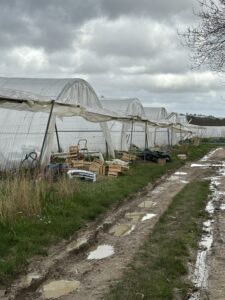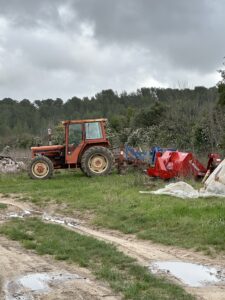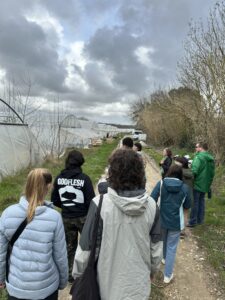Terracoopa is a ten-acre farm co-op located on a 200-hectare agripark in the Occitanie region. Also described as an incubator farm, this co-op helps provide farm land to rent for aspiring farmers or people already in the agriculture world. As a group, we visited the farm in the afternoon to be introduced to their ideas and what they’re all about. Of the ten acres that they have, only eight of the acres are used for farming. But there isn’t a lot of farmers involved in their program as of right now. Since covid, there has been a large decrease in people who have any interest in agricultural jobs. Because of this, only five of the eight acres are actually being used by farmers.

(Miles Avery, March 20th, 2025)
These land plots are being rented for three years and being used by those farmers to test different projects and practices on the land. Each farmer that rents land pays 2000 euros a year to keep the land, that payment not only gives them access to the farmland, but all of the machines and space to work on and grow their projects. Famers also pay for their share of water, Terracoopa has water access on the Rhône River, and each farmer tracks their water usage on a meter to know how much to pay. As we walked through the farm, we saw all the different things being grown. Other than a large quantity of fields full of vineyards there were also smaller greenhouse spaces that were being used to grow a large collection of different plants and flowers. All of the farming done on Terracoopa’s land is organic. They make sure to utilize processes like crop rotation, cover cropping, and integrated pest management (IPM) on the farmland.

(Miles Avery, March 10th, 2025)
Terracoopa also helps members who create organic, plant-based foods find different markets through processes like promotion or even creating a platform on Terracoopa’s online shop (Terracoopa). The goal of this help is to start boosting the farmers produce or goods, so they are able to continue on their own after they leave Terracoopa. What we learned when we were visiting was that sometimes farmers that leave Terracoopa stay local and keep the same connections that they gained while working with them. But some other farmers have to go somewhere else because the cost of land in the south is so expensive. But once they have their new land, they already know how to build those connections and find who they want to work with. Some farmers choose to something else entirely when they leave Terracoopa, which shows the importance of the program too. Since they are “test fields” then farmers aren’t completely committing to the agricultural job and lifestyle, if they are not enjoying it after the time, they spend at Terracoopa, they can go do something else without the burden of having to start over again.

(Miles Avery, March 10th, 2025)
Overall, we learned a lot about the agricultural world and lens when we visited Terracoopa. Programs like this are a great way to boost agricultural jobs and help educate the people who are involved in the agricultural work who are either new to it, or looking for more experience and connections.
https://terracoopa.com/